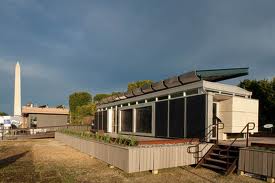Kohler Co. has partnered with several collegiate teams competing in the fifth Solar Decathlon, September 23 – October 2 at the National Mall’s West Potomac Park in Washington, D.C., by providing these teams with water-efficient Kohler and Sterling plumbing products.
College students from across the globe representing 20 universities have gathered to develop the most solar energy-efficient house in the competition sponsored by the U.S. Department of Energy.
The Solar Decathlon shows consumers how to save money and energy with affordable clean energy products that are available today. The Solar Decathlon also provides participating students with hands-on experience and unique training that prepares them to enter our nation's clean energy workforce.
“I am impressed with the students’ expertise on all aspects of green building – water efficiency, indoor air quality, materials, local sourcing and waste minimization – in addition to the energy efficiency focus of the contest,” said Rob Zimmerman, manager-engineering, sustainability and water conservation for Kohler.
Among the collegiate teams competing for the Solar Decathlon, which specified water-efficient plumbing products from Kohler is Purdue University, Zimmerman’s alma mater. “It’s encouraging that our young engineers, architects, and skilled trades are being educated this way, as they will be designing and constructing the homes, offices, and other buildings we’ll need in the coming years.”
The competing teams selected products designed to be water efficient and perform to expectations, including EPA WaterSense-listed toilets (Dual Flush and 1.28-gallon), showerheads and bathroom faucets, as well as commercial plumbing products including touchless faucets with the company’s award-winning Hybrid Energy System.
Kohler provided fixtures and faucets to Purdue and a handful of other teams such as Team Florida (University of Florida, South Florida, Central Florida and Florida State); Team Massachusetts (Massachusetts College of Art and Design, and the University of Massachusetts at Lowell); The Ohio State University; University of Illinois; Middlebury College; and Parsons The New School for Design and Stevens Institute of Technology. Kohler has been involved in the biennial Solar Decathlon since its inception in 2002.
The U.S. Department of Energy Solar Decathlon challenges collegiate teams to design, build, and operate solar-powered houses that are cost-effective, energy-efficient, and attractive. The winner of the competition is the team that best blends affordability, consumer appeal, and design excellence with optimal energy production and maximum efficiency.
The 2011 Solar Decathlon is open free to the public September 23 through October 2, (10 a.m. – 2 p.m. on weekdays, 10 am-5:30 pm on weekends). BD+C
Related Stories
Adaptive Reuse | Oct 22, 2024
Adaptive reuse project transforms 1840s-era mill building into rental housing
A recently opened multifamily property in Lawrence, Mass., is an adaptive reuse of an 1840s-era mill building. Stone Mill Lofts is one of the first all-electric mixed-income multifamily properties in Massachusetts. The all-electric building meets ambitious modern energy codes and stringent National Park Service historic preservation guidelines.
MFPRO+ News | Oct 22, 2024
Project financing tempers robust demand for multifamily housing
AEC Giants with multifamily practices report that the sector has been struggling over the past year, despite the high demand for housing, especially affordable products.
Performing Arts Centers | Oct 21, 2024
The New Jersey Performing Arts Center breaks ground on $336 million redevelopment of its 12-acre campus
In Newark, N.J., the New Jersey Performing Arts Center (NJPAC) has broken grown on the three-year, $336 million redevelopment of its 12-acre campus. The project will provide downtown Newark 350 mixed-income residential units, along with shops, restaurants, outdoor gathering spaces, and an education and community center with professional rehearsal spaces.
Office Buildings | Oct 21, 2024
3 surprises impacting the return to the office
This blog series exploring Gensler's Workplace Survey shows the top three surprises uncovered in the return to the office.
Healthcare Facilities | Oct 18, 2024
7 design lessons for future-proofing academic medical centers
HOK’s Paul Strohm and Scott Rawlings and Indiana University Health’s Jim Mladucky share strategies for planning and designing academic medical centers that remain impactful for generations to come.
Sports and Recreational Facilities | Oct 17, 2024
In the NIL era, colleges and universities are stepping up their sports facilities game
NIL policies have raised expectations among student-athletes about the quality of sports training and performing facilities, in ways that present new opportunities for AEC firms.
Codes and Standards | Oct 17, 2024
Austin, Texas, adopts AI-driven building permit software
After a successful pilot program, Austin has adopted AI-driven building permit software to speed up the building permitting process.
Resiliency | Oct 17, 2024
U.S. is reducing floodplain development in most areas
The perception that the U.S. has not been able to curb development in flood-prone areas is mostly inaccurate, according to new research from climate adaptation experts. A national survey of floodplain development between 2001 and 2019 found that fewer structures were built in floodplains than might be expected if cities were building at random.
Seismic Design | Oct 17, 2024
Calif. governor signs limited extension to hospital seismic retrofit mandate
Some California hospitals will have three additional years to comply with the state’s seismic retrofit mandate, after Gov. Gavin Newsom signed a bill extending the 2030 deadline.
MFPRO+ News | Oct 16, 2024
One-third of young adults say hurricanes like Helene and Milton will impact where they choose to live
Nearly one-third of U.S. residents between 18 and 34 years old say they are reconsidering where they want to move after seeing the damage wrought by Hurricane Helene, according to a Redfin report. About 15% of those over age 35 echoed their younger cohort’s sentiment.

















